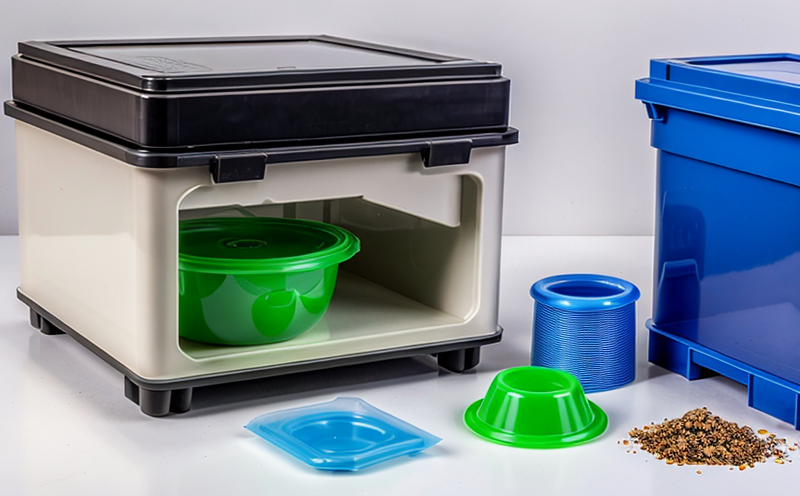ISO 20200 Plastics Packaging Disintegration Testing under Composting
The ISO 20200 standard is designed to ensure that plastics used in packaging degrade effectively during composting, thereby reducing the amount of plastic waste ending up in landfills and oceans. This testing method evaluates the disintegration characteristics of plastics under simulated composting conditions. It's a critical process for ensuring compliance with environmental regulations and standards aimed at sustainable packaging.
The test involves subjecting specimens to controlled temperature, humidity, and oxygen levels that mimic industrial composting environments. Specimens are typically exposed to these conditions over extended periods—often 12 months or longer—to assess their ability to break down into smaller components or even biodegrade entirely within the specified timeframe.
One of the key aspects of this testing is understanding how different plastics behave under composting conditions. For instance, bioplastics and conventional plastics like polyethylene (PE) and polypropylene (PP) exhibit varying degrees of degradation. This test helps manufacturers tailor their products to meet ecological requirements.
The process involves meticulous specimen preparation, including cutting the plastic into small, uniform pieces that closely represent how they might be found in a real-world composting environment. Once prepared, these specimens undergo rigorous testing protocols designed to simulate industrial composting conditions accurately.
Instrumentation plays a crucial role here; specialized incubators are used to maintain consistent temperature and humidity levels throughout the test duration. Additionally, automated systems may monitor degradation rates through periodic sampling and analysis.
The results of this testing provide valuable insights into whether plastics comply with environmental standards set forth by regulatory bodies worldwide. Compliance ensures that products contribute positively to waste management strategies focused on reducing landfill use while promoting recycling efforts.
Industry Applications
| Application Area | Description |
|---|---|
| Sustainable Packaging Development | Developing new packaging materials that meet both functional performance requirements and environmental sustainability goals. |
| Regulatory Compliance | Ensuring compliance with international standards related to compostable plastics, such as ISO 20200. |
In the realm of sustainable packaging development, ISO 20200 plays a pivotal role. It allows companies to innovate by creating products that not only serve their intended purpose but also degrade safely in composting facilities. This dual-purpose approach enhances product performance and environmental responsibility.
For regulatory compliance, this test ensures manufacturers stay ahead of evolving environmental policies globally. Many countries are implementing stricter regulations on plastic waste, making ISO 20200 a mandatory step for those seeking to enter or maintain their presence in international markets.
Quality and Reliability Assurance
- Consistency of Material Performance: Ensuring that the material properties remain consistent across different batches.
- Environmental Impact Assessment: Evaluating how a product impacts the environment throughout its lifecycle, focusing on end-of-life considerations.
Achieving reliable and repeatable results is essential in quality assurance. By adhering strictly to ISO 20200 guidelines, laboratories can provide consistent data that reflects real-world composting conditions accurately. This consistency builds trust with clients and regulatory bodies alike.
Additionally, assessing environmental impacts early in the design process allows for informed decision-making regarding material selection and formulation adjustments needed to meet sustainability targets effectively.
International Acceptance and Recognition
The ISO 20200 standard is widely recognized across various countries and industries. Its acceptance is a testament to its effectiveness in promoting sustainable practices within the packaging plastics sector. Many governments and organizations have adopted this standard as part of their broader initiatives aimed at reducing plastic waste.
For instance, several European Union member states require compliance with ISO 20200 when specifying compostable packaging for public procurement processes. Similarly, in North America, leading companies are integrating these requirements into their sustainability strategies.
The widespread adoption of this standard underscores its significance in driving change towards more sustainable practices globally. By adhering to such standards, organizations demonstrate leadership in environmental stewardship and contribute positively to the collective effort against plastic pollution.





